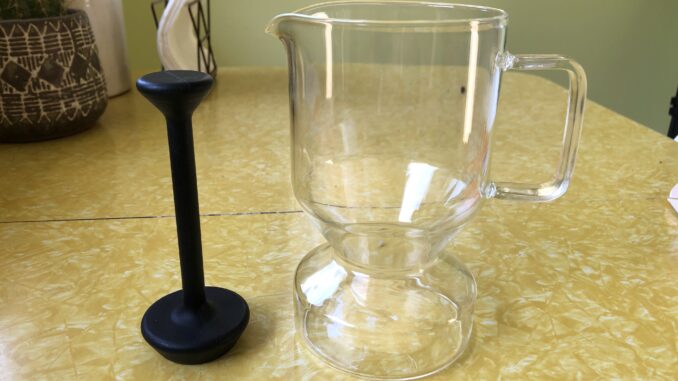The Cupping Brewer is a vessel made to allow minimal waste, and coffee tasting that is filter-free.
BY KATRINA YENTCH
BARISTA Magazine ONLINE
Photos from Katrina Yentch
I’ve always felt it heartbreaking to watch the cupping bowls of delicious coffee tossed through a strainer sink. It was a bit counterintuitive for a sustainable business to throw out a hefty amount of products. For the coffees I really enjoyed I’d often find myself drinking them using my cupping spoon, much like soup, and wishing that I had the ability to drink them all without the influence of any brewing technique. Therefore the Cupping Brewer is an ideal solution for being a germ-free and waste-free.
What is the Cupping Brewer? And How Does It Function?
The Cupping Brewer is a product by a long-time coffee expert (and co-author of “Test Drive” columnist) Josh Taves, who realized the need to change the traditional methods of coffee cupping into be less cumbersome and specifically designed for the experience.
The Cupping Brewer is a sleek and simple glass vessel that is shaped like a pitcher. It is intended to cube coffee, however, it is also used to drink the coffee-cupping liquid after cupping is completed. To make this feasible, a plunger is included in the vessel. people plug into the center of the brewer in order to prevent coffee grounds from escape. After breaking up the crust, and then scraping it away like a typical cupping session, plug in the plunger into the brewer and pour the top portion of the coffee into a cup for enjoyment.
A Long-Term Product Designed to the Future of Coffee
The Cupping Brewer has been in use since the mid-2000s. It’s remarkable that this product was not being viewed more widely during the initial year of COVID, particularly in the context of when the SCA had come up with new and extensive cupping protocols in order to address the practice’s known tendency to spread germs. No matter if the traditional cupping method has been brought back to the table (and in some instances it has however, in my experience it’s not often seen within an internal setting nowadays) The Cupping Brewer remains as relevant as ever.
Prosumers have emerged from the ashes of the pandemic and is now demanding special-coffee equipment for the home. The traditional cupping technique of using a variety of hyper-specifically designed bowls that hold a variety of coffees doesn’t seem to be able to handle this. So the Cupping Brewer makes it easier for both professional coffee drinkers and consumers at home to test only one particular coffee at a go and then drink it later. It’s just logical.
The simplicity of the Cupping Brewer
One of the things I loved the most about this brewer was its ease of use. It’s a simple method to set up a tasting of coffee, which is doable for those who’ve never ever had coffee. Three-step, illustrated instructions on the website tells you to mix 30 grams of coffee in 500mL of hot water. Wait for four minutes, then cut and dispose of the crust before plugging in and pouring the final results.
Other cupping-savvy aspects in the cup include a design that is thought to be a reference to wine decanters in order to bring out the aroma in the dry-ground assessment. The shape also helps separate the coffee grounds from the liquid that is brewed more easily, making it less likely to see them end up inside the cup. This makes the vessel difficult to clean manually. You will require a dishwasher or handle brush for cleaning the interior of the Cupping Brewer.
A Cupping Brewer is designed for drinking
Alongside its difficulty in cleaning, the only downside to the brewer is that it cannot use the exact amount of coffee recommended by the SCA to test the coffee. After experimenting with a 1:18 ratio that included 11g of coffee in 200mL of water produced an odd amount of coffee to pour into the cup. The coffee itself wasn’t shining as brightly as it would have if there was the larger amount of ground coffee being used. So, be ready to drink a large cup of coffee making use of this method, in contrast to the small amount of sip and slurp of a standard cupping. In this way it may be difficult to try a variety of coffees in this manner.
Overall it’s clear that the Cupping Brewer makes a delicious cup of coffee, which is reminiscent of coffees made using the Able Brewing Kone. It addresses the major issues regarding coffee cupping in a very simple manner and I believe it would be a good instrument for cafes that receive samples from roasters and need an easy method of tasting the coffees. For quality control and a variety of coffees, it might be better to go with the traditional method.
This article was first published at Barista Magazine, an online magazine dedicated to baristas and coffee professionals.
